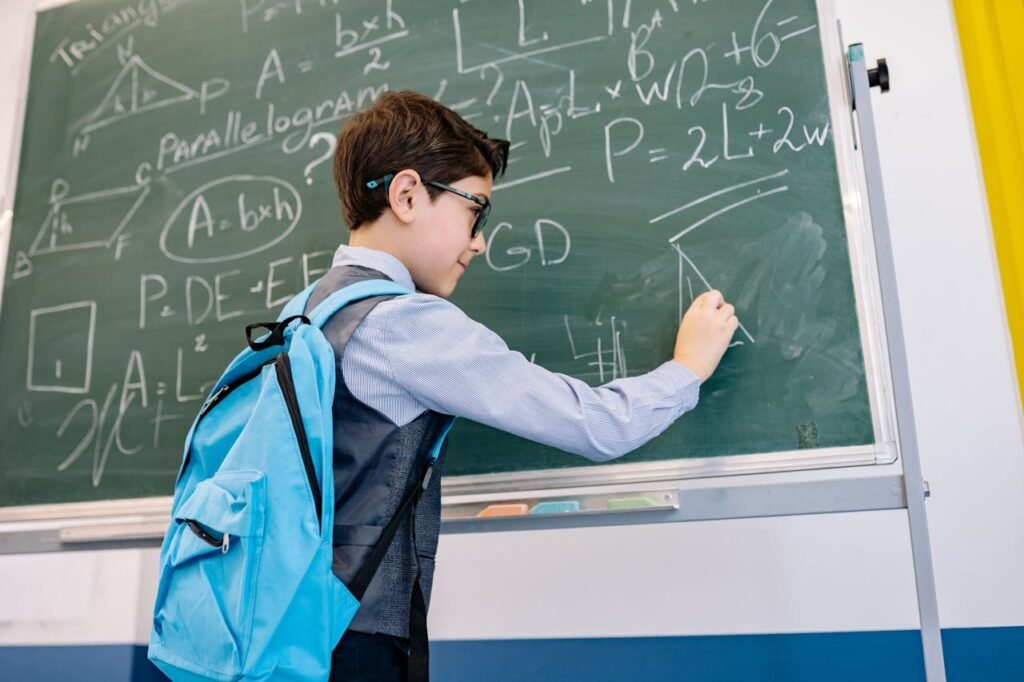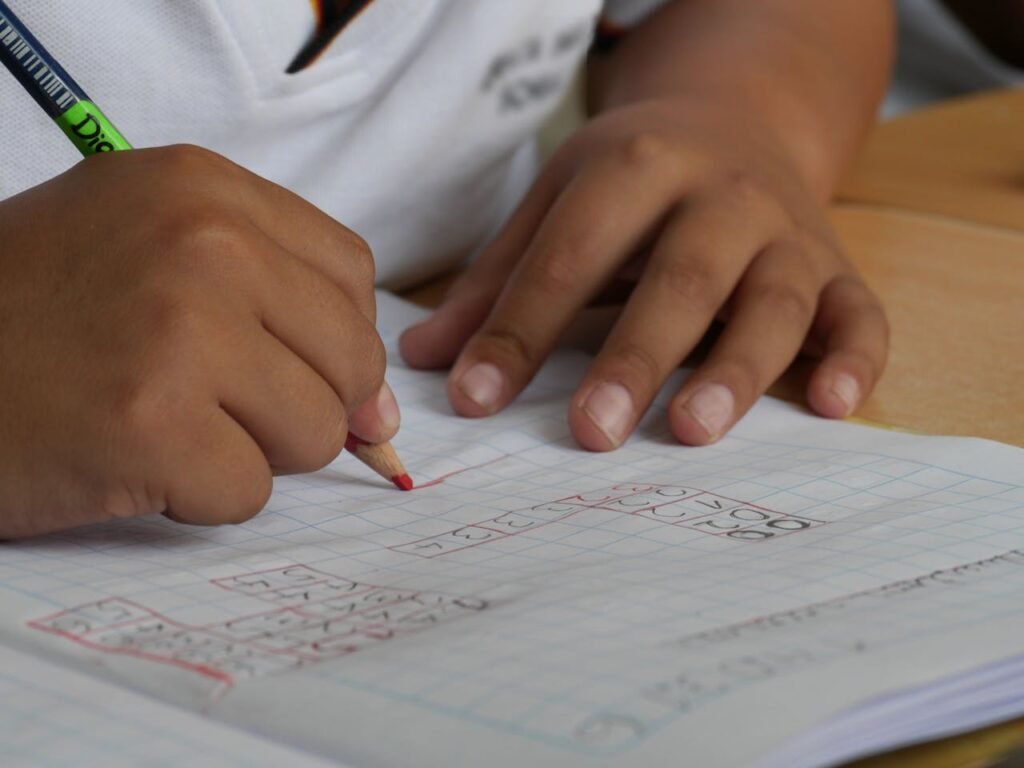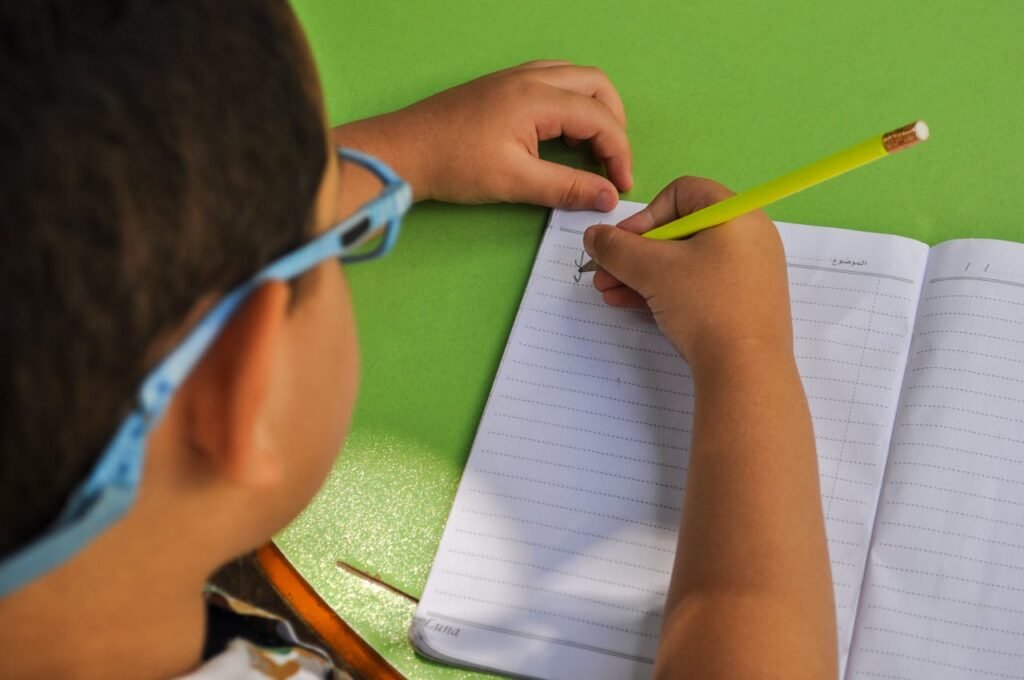Algebra can feel like a big, scary word—both for kids and their parents. The moment it comes up in conversation, many adults think back to the x’s, y’s, and confusing equations they once struggled with. So it’s natural to ask: When should my child start learning algebra?
The answer isn’t the same for every child. Some kids are ready earlier than others. Some schools introduce it sooner. And some families wonder if they should wait until high school—or start before middle school.
In this article, we’ll break it all down in a way that’s easy to understand. You’ll hear what experts think, what signs to look for in your child, and how to help them get ready—without stress. We’ll even share how Debsie helps kids learn algebra with ease, fun, and confidence.
Let’s explore when the right time really is—and how to make sure your child doesn’t just start algebra, but succeeds at it.
What Is Algebra, Really?
Before we talk about when to start algebra, let’s first understand what algebra really is.
Algebra is just a way of solving problems when you don’t know all the numbers yet. Instead of giving you every piece of the puzzle, algebra gives you some numbers and a mystery to solve.
For example:
If I say, “Something plus 3 equals 7,” what’s the missing number?
Your brain probably said, “It’s 4.”
That’s algebra. You just solved x + 3 = 7.
So, algebra is not about being a math genius or knowing lots of big words. It’s about using logic and smart thinking to find missing values. That’s something even younger kids can start doing in small steps, long before they ever see the word “algebra” in a book.
Is There a “Right Age” to Start Algebra?
Most schools introduce algebra officially around Grade 7 or 8, which is when kids are about 12 to 14 years old. But does that mean every child should wait until then?
Not really.
Some children are ready to think in algebraic ways much earlier—sometimes as young as 9 or 10. That doesn’t mean they’re solving huge equations. It just means their brains are starting to recognize patterns, understand unknowns, and think in steps. That’s the foundation of algebra.
Experts say it’s less about age and more about readiness. So what should you look for?
Here are a few signs your child might be ready to begin algebra:
- They enjoy solving puzzles or brainteasers.
- They’re comfortable with basic multiplication and division.
- They can follow multi-step instructions without getting confused.
- They ask “what if” questions or like to explore patterns.
If your child shows even some of these, it’s a good sign that they’re starting to think algebraically—even if they don’t know it yet.
Why Starting Early Can Be a Good Thing

Here’s something important: starting algebra early doesn’t mean rushing your child. It means giving them a head start—gently and at their pace.
When kids begin exploring algebra early, they build stronger thinking habits. They learn how to:
- Break problems into steps
- Look for patterns
- Think flexibly and creatively
- Handle mistakes without fear
These skills help not just in math, but in life. Kids who practice early algebra often become better problem-solvers, better test-takers, and more confident learners overall.
But the key is this: it must be taught the right way—with simple words, real-life examples, and lots of patience. Not worksheets full of scary-looking symbols.
That’s where programs like Debsie come in. We teach algebra by making it feel real and fun, not something to fear.
How Early Algebra Looks in Real Life
One of the best ways to help children understand algebra is by showing them that it’s not just something that lives inside textbooks. Algebra is already part of their everyday world. Even before kids learn the word “algebra,” they’re already solving simple algebraic problems—at the dinner table, on the playground, or while playing games.
Let’s explore how this works in real-life situations, using language kids already know.
Solving the Unknown (Without Saying “x”)
Imagine your child is trying to figure out this:
“I had some cookies. I gave 3 to my friend. Now I have 5 left. How many did I have at the start?”
What are they really doing?
They’re solving:
? – 3 = 5
That’s the exact same thinking used in algebra. In school, it might be written like:
x – 3 = 5
And the child would solve it by figuring out that x = 8.
So even if they haven’t seen algebra symbols yet, their brain is already doing algebra. They’re using logic to find missing pieces.
Making Rules and Spotting Patterns
Let’s say your child is stacking blocks and notices this pattern:
- Stack 1: 2 blocks
- Stack 2: 4 blocks
- Stack 3: 6 blocks
- Stack 4: ?
They say, “It goes up by 2 each time. So the next one is 8 blocks.”
That’s early algebra.
Why? Because they’re identifying a pattern and making a rule from it. They’re doing what algebra does—finding the rule behind the numbers.
In algebra, we call this a “function” or “sequence,” but kids don’t need to know that yet. What matters is, they’re noticing relationships and predicting what comes next. That’s the core of algebraic thinking.
Comparing Two Ideas
Here’s another example:
“If you have 3 apples and your sister has 5 apples, how many more does she have?”
That’s a simple comparison. But comparisons become more useful and powerful when kids learn to use equations.
This thought:
5 – 3 = 2
Can grow into:
sister’s apples – my apples = difference
It’s algebra—just without the scary symbols.
Once children begin to think in terms of “What’s the difference?” or “How many more?” they’re building the early framework for solving algebraic expressions.
Real-Life Situations with Money and Time
Let’s say you give your child ₹200 to spend at a store. They spend ₹120 and want to know how much they have left. They’re doing this:
₹200 – ₹120 = ?
That’s subtraction. But algebra teaches them to think in flexible ways too, like:
Starting money – spent money = money left
This way of thinking helps them understand not just how to get the answer, but why it works. They begin to see math as something they can use to solve real problems.
This builds math confidence early—and that confidence makes a huge difference when they meet algebra in school.
What Happens If You Wait Too Long?
Sometimes parents think it’s best to wait before introducing algebra. Maybe they believe their child “isn’t ready,” or maybe they’re worried about overwhelming them too early. That’s totally understandable. We all want learning to feel safe, not stressful.
But here’s the thing: waiting too long can actually make algebra harder—not easier.
Let’s unpack why.
Algebra Suddenly Feels Like a Giant Jump
Imagine this: a child has been doing simple math—adding, subtracting, maybe some multiplication. Then one day in middle school, the teacher says:
“Today we’re learning how to solve for x. Here’s an equation: 3x + 2 = 11.”
To a child who’s never seen variables or been asked to think in steps, this feels like someone just dropped them in the deep end of the pool—without warning.
It’s not just new; it’s too new. The ideas come fast. The symbols are unfamiliar. The confidence drops.
That’s when you start hearing things like:
- “I don’t get this.”
- “Math is too hard now.”
- “I was good at math until this.”
Not because the child isn’t capable—but because the transition into algebra was too sharp. Too sudden. Too stressful.
Delayed Exposure Often Leads to Fear
When kids don’t meet algebraic ideas early—like variables, unknowns, or simple problem-solving—they start to think of algebra as something big and scary.
And that fear turns into avoidance.
They might:
- Stop raising their hand in class
- Rush through homework without trying
- Dread math lessons
- Feel “not smart enough”
This has nothing to do with their intelligence. It’s all about how and when they were introduced to new ways of thinking.
Think of it this way: if a child learns to swim slowly, in shallow water, they feel calm and safe. But if you throw them into the deep end without warning, they panic—even if they’re fully able to swim.
The same thing happens with math.
It’s Harder to Catch Up Later
When children hit a wall in math—especially in algebra—they often fall behind. And catching up isn’t easy, because algebra builds on itself.
Each topic relies on the last:
- You need to understand variables to work with expressions.
- You need expressions to solve equations.
- You need equations to understand formulas.
If a child misses the foundation, every new lesson feels harder. They start to believe they’re “just bad at math.” And once they believe that, it becomes a cycle.
This is why experts and experienced teachers agree: it’s better to introduce algebra gently and early than to wait and struggle later.
How Do You Know If Your Child Is Ready for Algebra?
Now that we know early exposure to algebra helps, the big question is: How do you know when your child is ready to start?
The truth is, there’s no magic age or grade. Kids don’t wake up one day and suddenly say, “I’m ready for algebra!” But if you look closely, you’ll see little signs that show they’re thinking in ways that prepare them for it.
Here are some things to look for:
They Start Noticing Patterns
Patterns are everywhere. If your child can spot a number pattern—like 2, 4, 6, 8—or even one in shapes or sounds, they’re starting to understand relationships between things. That’s a key part of algebra.
They might say, “It goes up by 2 each time,” or “Every other square is red.” This means they’re starting to build rules from what they see. That’s early algebraic thinking.
They Ask “What If” Questions
When a child starts saying things like:
- “What if I had 10 more?”
- “What would happen if we doubled this?”
- “Can I get the same answer a different way?”
These are signs of flexible thinking—which is exactly what algebra asks kids to do.
They’re not just solving problems. They’re exploring them, testing ideas, and looking for different paths to the same answer. That’s the kind of brainwork algebra loves.
They Understand the Basics Well
Algebra needs a strong base. Your child doesn’t need to be perfect at every operation, but they should be comfortable with:
- Adding and subtracting with ease
- Multiplying and dividing without always reaching for a calculator
- Working with fractions and simple word problems
If your child gets frustrated with basic steps, they’ll likely struggle with algebra. But if they move through those steps with confidence, they’re ready to go further.
At Debsie, we help students strengthen the basics while exploring new concepts, so they grow without pressure.
They Show Interest in Problem Solving
Some kids love puzzles, riddles, or even just trying to “figure things out.” That curiosity is a great sign. It means they’re not afraid of challenges, and they enjoy the journey of solving something step by step.
That’s the exact mindset needed for algebra—where the answer doesn’t always come right away, but it always feels good when it finally does.
Even if your child isn’t showing all these signs right now, don’t worry. Readiness is not about being perfect—it’s about being open, curious, and willing to learn.
And most importantly: kids learn best when they feel safe, supported, and understood.
How Debsie Helps Kids Get Ready for Algebra (Without Stress)
At Debsie, we don’t believe in rushing children into complex math before they’re ready. We also don’t believe in waiting until they’re lost or afraid of the subject. We believe in meeting every child right where they are—and helping them move forward with confidence.
Here’s how we prepare kids for algebra in a way that feels calm, natural, and fun:
We Teach Algebra Without Calling It “Algebra” (At First)
One of the best ways to help children is by removing the pressure. That’s why at Debsie, we start with games, stories, and real-world puzzles—long before we introduce equations or variables.
For example:
- A puzzle where they find a missing number:
“A number plus 5 equals 12. What’s the number?” - A riddle with patterns:
“If each robot has 2 arms, how many arms do 4 robots have?”
These are algebraic ideas—just without the heavy language. Kids start solving them confidently because they’re not afraid. Then later, when we show them the same problem using letters like x, they say, “Oh! I’ve done this before!”
We Use Real-Life Examples Kids Care About
Children learn best when the math feels relevant. That’s why Debsie teachers use examples from everyday life:
- “If a pizza has 8 slices, and you eat some and 3 are left, how many did you eat?”
- “You have ₹50. You buy a snack and have ₹20 left. How much did the snack cost?”
These questions aren’t just more fun—they’re more powerful. They help children connect numbers to the world they live in. They begin to see that math isn’t just about answers—it’s about understanding life.
Our Teachers Know How to Spot Readiness
Every child is different. Some are quiet learners who need time. Others jump ahead and want a challenge. Debsie’s partner teachers are trained to spot the small signs of readiness and adjust the lesson for each student.
We don’t use one-size-fits-all lessons. We use the power of personalized teaching—the kind that helps every child feel seen, heard, and capable.
If your child is ready for a challenge, we’ll give them more. If they need to slow down, we’ll gently guide them. We believe every child deserves to feel smart at their own pace.
Learning Feels Like Play
All of Debsie’s learning is gamified, which means every math topic feels like a mission, not a lecture. Kids earn points, unlock badges, and get rewards for solving math problems and completing activities.
That means algebra doesn’t feel like a subject—it feels like an adventure. And when kids enjoy the journey, they want to keep going. That’s how real, lasting learning happens.
Why Early Algebra Matters for Your Child’s Future
Learning algebra is not just about passing tests or moving up in school. It’s about building the thinking muscles your child will use for the rest of their life.
When a child learns how to solve for the unknown, they also learn how to:
- Stay calm when facing hard questions
- Break big problems into small steps
- Think logically and clearly
- Stay curious instead of getting frustrated
These are the skills that help in every subject—not just math. They help in science, reading, technology, even writing stories or solving friendship problems. Algebra teaches your child how to think, not just how to count.
Starting early—gently and with the right support—gives your child time to grow these skills without stress. It gives them room to ask questions, to make mistakes, and to enjoy learning. And that kind of learning is the kind that sticks.
At Debsie, We Make Algebra Feel Like a Superpower
At Debsie, we don’t just teach algebra—we unlock it. We help kids see it as a way to solve mysteries, discover patterns, and understand the world around them.
We do this by:
- Starting early with logic games and puzzles
- Using real-life examples and stories
- Personalizing every lesson to fit each learner
- Keeping it playful, hands-on, and full of praise
- Supporting parents every step of the way
Our students don’t fear algebra. They grow into it—just like they grow into their favorite hobbies, sports, or books. Because when math is taught with heart, it becomes something kids can be proud of.
Conclusion: Algebra Is Not a Race—It’s a Journey
There’s no perfect age or one-size-fits-all moment when every child should start algebra. But there is a perfect way to introduce it: with patience, support, and joy.
The truth is, your child is probably thinking algebraically already—when they notice patterns, solve puzzles, or try to figure out “what’s missing.” That’s where the journey begins. And with the right guidance, that journey becomes exciting instead of scary.
At Debsie, we help kids take their first steps into algebra with confidence. We meet them where they are, build their thinking step by step, and help them grow into bold, curious problem-solvers.
🎓 Join Debsie’s global family today.
👉 Book a free trial class now and let’s help your child discover the joy of math—starting with algebra.
Because when learning feels right, anything is possible.
Read Next:



